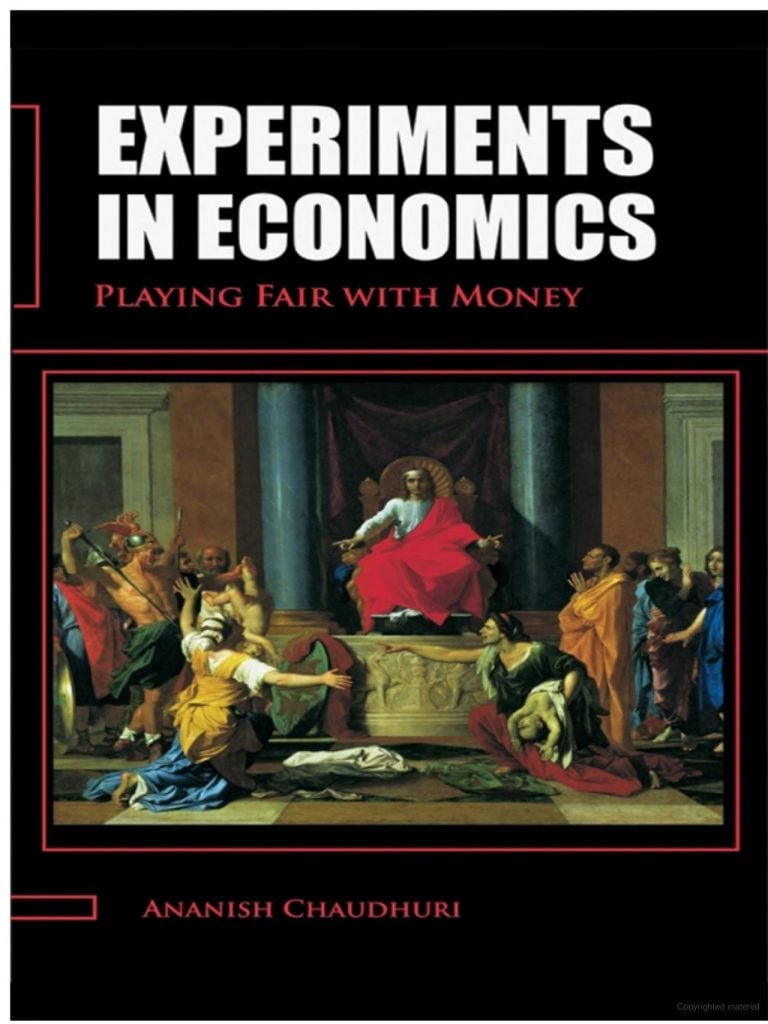Experiments in Economics: Playing Fair with Money, Routledge, January 2009.
Reviews
In the Journal of Economic Literature, David J. Cooper of Florida State University wrote: What this book is perfect for is giving interested readers who are not professional economists a flavor of what experimental economics does and why it is important. It is the book I gave my mother when she wanted to understand what I was always babbling about (she loved it!)…
Giovanna Devetag of the University of Perugia writing for the Journal of Economic Psychology said: The book is fun to read, well written, and different kinds of readers may find it useful: the professional reader can obtain a broad-brush picture of the state of the art in a very lively area of behavioral game theory, getting some idea about the most interesting controversies on the sources of human cooperation. … The most important merit of the book is definitely the author’s attempt at making experimental research (and its many interesting implications) available to a more general public, which is essential, I believe, in filling the gap between academics within the social sciences and society at large.
Angela de Oliveira (University of Massachusetts – Amherst) in the Journal of Behavioral and Experimental Economics: (The book) will make a good introduction for the general public, or (if supplemented with some information on market experiments) for use in an undergraduate class in experimental economics. Even for seasoned researchers, this review is an enjoyable read and the examples are useful for presentations to audiences not familiar with experimental or behavioral economics and would make a good addition to an academic’s bookshelf.
Endorsements
This is an excellent volume on experiments in economics, demonstrating that expectations for fair outcomes and trust are major driving forces behind economic behavior. Chaudhuri explains themes such as price discrimination, gift exchanges and public goods, neatly including their roles in economic behavior. The many clear examples make the book accessible to a wide audience. I expect this book to find a prominent place in many economic libraries.
Ernst Fehr, University of Zurich
Despite the great interest in experimental and behavioral economics over the past 20 years there is still a dearth of books that one can use to teach from and which can be used by laymen to learn what is going on in this rapidly changing field. Ananish Chaudhuri has written a wonderful book which is motivated by real world experiences yet closely tied to the state of the art research in experimental and behavioral problems. Dealing with problems of trust, fairness, social coordination, public goods and social dilemmas Chaudhuri takes the reader on a wonderful adventure from which he or she will certainly benefit. I highly recommend this book.
Andrew Schotter, Professor of Economics, Director, Center for Experimental Social Science, New York University
Chaudhuri has written an extremely readable introduction to experimental economics. This is perfect for advanced undergrads or graduate students who want to learn about state of the art research without being smothered by technical details.
David J. Cooper, Professor of Economics, Florida State University
With lucid prose and a wonderful set of examples, Ananish Chaudhuri brings important results in experimental economics to life, linking concepts such as trust, fairness and reciprocity to our everyday actions. At the same time, Experiments in Economics introduces the reader to the science, with engaging accounts of how economists use experiments to get answers to key questions in strategic decision making.
Gary Bolton, Professor of Business Economics and Executive Programs Faculty Fellow, Smeal College of Business, Pennsylvania State University
Are people fair-minded and helpful or selfish in the end? Why and whom do people trust? Why do people engage in community work? Why do people obey social norms and conventions? Not long ago these questions, which are at the heart of social life, were deemed outside the realm of economics. The advent of experimental economics and the interchange with the behavioral sciences has changed this picture entirely. Professor Chaudhuri is to be raised for having written a highly readable and informative account of one of the most exciting developments in the social sciences.
Simon Gaechter, Professor of the Psychology of Economic Decision Making, University of Nottingham
Ananish Chaudhuri has produced a masterful guide to the experimental literature on behavioral economics. Full of interesting real world examples, this exceptionally well-written book is accessible to non specialists. Yet, it nonetheless provides important insights into the scientific methodology of experimental economics, examining just how its practitioners go about designing experiments to elucidate the roles that abstract concepts such as fairness, trust, and reciprocity play in explaining human interactions. Regardless of whether one is a behaviorist, experimentalist, or “traditionalist”, this is a must read.
John C. Panzar, Professor of Economics, University of Auckland and Louis W. Menk Professor (Emeritus), Northwestern University
